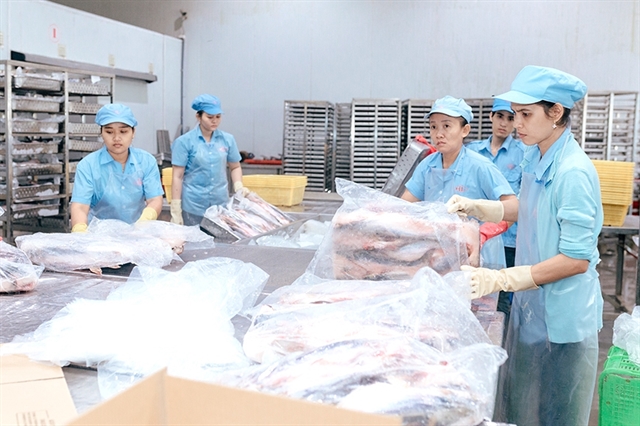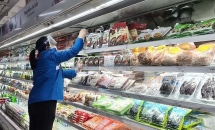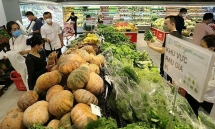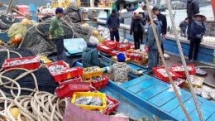Demand for cold storage increases during COVID-19
 |
| Staff at Hoang Lai Group process seafood products. Seafood was reported to have the highest demand for cold storage. |
Food accounts for about 80 per cent of cold storage demand in Vietnam, according to data.
However, that figure is rising as the F&B industry suffers and food export orders are cancelled.
From mid-March, the demand for cold storage has been rising in Ha Noi. According to Tan Bac Nam Cold Storage Firm, demand doubled last month. A representative from the firm said many restaurants had closed and needed to put their stocks in cold storage.
Meanwhile, the owner of a 3,000-tonne cold storage facility in HCM City said his unit was full until the end of April so he could not receive any more goods despite the demand.
Seafood was reported to have the highest demand for cold storage.
According to the Viet Nam Association of Seafood Exporters and Producers (VASEP), 20 to 40 per cent of seafood exports orders had been delayed, while 20 to 30 per cent had been cancelled.
VASEP General Secretary Truong Dinh Hoe said that due to the prolonged pandemic, seafood enterprises were in serious shortage of cold storage, forcing them to cut purchases of fresh produce.
Hoe also said it would be difficult for Viet Nam to find new markets once consumption resumed after the pandemic.
VASEP has asked the Ministry of Agriculture and Rural Development to propose to the Government and State Bank incentive policies to support local enterprises to build cold storage facilities.
This would include zero interest loans for the first two years and a 50 per cent interest rate reduction for the next four years for long-term loans to build cold storage units with a minimum capacity of 5,000 pallets.
It also asked for a 50 per cent reduction of corporate income tax for the first two years for cold storage businesses.
Opportunities for cold storage industry
In these circumstances, real estate research firm CBRE Viet Nam told local media the lack of cold storage units was an opportunity for the industry. The growth of online sales and multi-channel retail could be an advantage for firms with cold storage units near metropolitan areas.
According to a report by FiinGroup, an integrated service provider of financial data, business information, industry research and other premium services, the total capacity of cold storage in Vietnam stood at 600,234 pallets in 2018.
The firm also said due to rising demand for cold storage, many providers are expected to expand.
Earlier, Ken Research, a global publisher of market intelligence, reported that from 2016-21, the Viet Nam Cold Chain Industry was estimated to register a positive CAGR of 10.4 per cent thanks to the growing number of supermarkets and seafood exporters.
Ken Research estimated the local cold chain market would reach US$1.8 billion next year.
 | Sufficient consumer goods for the nationwide demand in Vietnam Vietnam has prepared sufficient consumer goods for a 15-day nationwide curfew requesting people to stay at home and practice social distancing, according to officials. ... |
 | Hanoi supermarkets are able to meet people's goods demand even covid 19 cases increasing Many supermarkets in Hanoi have stockpiled much goods to meet panic buying demand when Covid-19 cases were confirmed in the city. |
 | Vietnam demands China respect its maritime economy Vietnam hopes China will thoroughly solve maritime disputes without affecting the bilateral ties. |










